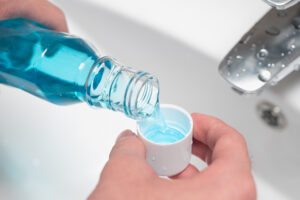When it comes to your at-home practices for maintaining good oral hygiene, you want to use the best products possible to ensure a healthy mouth and radiant smile. One such product is a specialized mouthwash, particularly one designed to help treat, manage, and prevent gum disease.
ensure a healthy mouth and radiant smile. One such product is a specialized mouthwash, particularly one designed to help treat, manage, and prevent gum disease.
While there are many mouthwashes available in the marketplace today, not all of them are safe or beneficial for this purpose. It’s essential, then, to know what to look for so you can choose the best one to use.
What is Gum Disease Exactly?
Gum disease, also referred to as periodontal disease, is a major contributor to patient tooth loss and can also be linked to serious health conditions, such as stroke or heart disease.
The first stage of gum disease is called gingivitis. A mild condition, gingivitis results in pockets developing between teeth and gums due to tartar or plaque build-up. If not treated, it can lead to periodontitis, a more advanced form of gum disease that can lead to tooth loss and more.
Gum disease usually shows symptoms such as painful and inflamed gums, frequent bleeding especially when flossing or brushing, bad breath (halitosis), and a receding gum line.
While a treatment recommended and provided by your dentist is necessary to alleviate your gum disease, you can also take measures at home, including the use of a beneficial mouthwash.
How Can Mouthwash Help with Gum Disease?
Your mouthwash can become a powerful tool in your dental hygiene practice. By using it in conjunction with brushing and flossing, you can help prevent gingivitis by killing off the responsible bacteria behind gum disease and also limiting plaque build-up that can lead to tooth decay and inflamed gums.
Tips for Finding the Best Mouthwash for Gum Disease
For help in choosing the right mouthwash for your mild gum disease, or to prevent gum disease and inflammation altogether, consider the following.
Avoid mouthwashes containing alcohol
While alcohol, in general, is often used to kill bacteria in other parts of the body, the alcohol you find in mouthwash is not there for this purpose. Instead, it is there to serve as a diffuser of the other active ingredients contained within and can lead to negative effects within your mouth.
For one, alcohol in the ingredients can dry out your mouth and, in turn, can facilitate an increase in overall gum disease. Alcohol itself is a type of drying agent and will reduce the production of saliva inside your mouth. This saliva reduction can result in bad breath, or halitosis, and increase the level of bacterial growth.
Alcohol may also cause a burning sensation which can increase the discomfort for those already suffering with gum and teeth sensitivity.
For these reasons, choose an alcohol-free mouthwash that will combat the plaque and gingivitis-inducing germs, maintain saliva production, and not cause discomfort or sensitivity.
Consider mouthwashes that contain antimicrobial ingredients
Look for a mouthwash containing antimicrobial ingredients such as chlorhexidine. Chlorhexidine is a broad-spectrum antimicrobial particularly useful in clearing out the bacteria that can cause gingivitis. Your dentist most likely already uses a mouthwash with this ingredient to treat your gum disease and reduce inflammation.
Avoid any long-term use of mouthwashes with chlorhexidine, however, because they can increase dry mouth and alter taste if used continually.
Look for condition-specific mouthwashes
Look for a mouthwash that focuses on preventing or treating gum disease, with the goal of removing harmful bacteria from the mouth and gums.
Mouthwashes that specialize in treating dry mouth can also be helpful, as dry mouth symptoms often lead to a higher rate of gum disease.
Best Ways to Use Mouthwash
To get the most benefits from your mouthwash, do the following.
- Before using your mouthwash, brush and floss your teeth as normal to increase its effectiveness.
- Follow the directions on how much mouthwash to use each time. Many of them come with attached dosage cups to help with this. Avoid diluting the mouthwash with water as this can render it less effective.
- Swish the mouthwash all around inside your mouth for up to 60 seconds. The longer you can keep the mouthwash in, the better.
- End by gargling for at least 30 seconds. This action will help kill bacteria sitting on your tongue and clinging to the back of your throat.
- Avoid rinsing afterward, as it can limit the effectiveness of the mouthwash.
Find Out More About Gum Disease and Treatments at Stiles Dental Care Today
When it comes to the health of your gums and teeth, finding the right treatment can make all the difference. The team at Stiles Dental Care will take the time to discuss your options, create a treatment plan, and make recommendations on measures you can take at home, such as using a beneficial mouthwash. Contact our office in Medford today with any questions you have and to schedule a periodontal exam.
